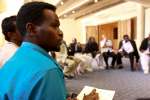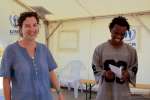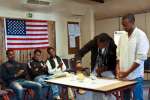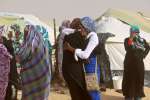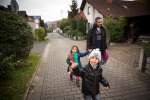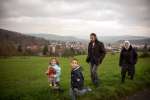- Text size
 |
|  |
|  |
| 
- Français
1 Family: In Nepal, family torn between new life and leaving loved ones behind
News Stories, 17 June 2013
DAMAK, Nepal, June 17 (UNHCR) – Seventy-nine-year-old Keshar Singh Rai vividly remembers the day he started his life as a refugee. It was August 1992, when he came to Nepal from Bhutan with his wife Bhai Maya Rai and their three sons.
"Before leaving Bhutan we were in the greatest dilemma of our life. We made a very difficult decision to leave Bhutan without our eldest son and two daughters," said Keshar Singh, with tears rolling down his cheeks. Their eldest son was in a different town for work and two daughters were already married and living with their husbands' families.
For the last 20 years, Keshar Singh and his family have been living in Beldangi refugee camp in eastern Nepal. His three sons got married and have their own families. The patriarch and his wife now live with his second son, Harka Singh Rai.
Lately they have been grappling with another major dilemma concerning their future.
A major resettlement programme has been under way in the camps for the refugees from Bhutan since 2007. Nearly 80,000 refugees have already departed from Nepal and started their lives afresh in eight different countries.
Of the original population of 108,000, only some 37,000 refugees from Bhutan now remain in camps in eastern Nepal. With the large number of resettlement departures, the camps have been merged and closed. Currently there are only two camps hosting these refugees – Beldangi and Sanischare.
"It is a very difficult decision on whether to go for resettlement or not. We have lived a major part of our life in Nepal which is like our second home," said Keshar Singh, describing the similarities between Bhutan and Nepal – the mountains, climate, language and religion.
His wife Bhai Maya, 77, does not remember much about Bhutan but becomes quite emotional while talking about their future. "All these years we had the hope that someday we would return to Bhutan, but the hope is dying."
The couple discuss their future with their sons in the camps regularly and are sure that eventually they will choose resettlement. "We just want to wait for some time to hear from our eldest son in Bhutan before we take the final decision," said Keshar Singh. "He is our son, whom we have not met for the last 20 years, and I want to meet him or hear from him once before we go to a distant land."
Keshar Singh understands that his wish is a difficult one. At the same time he laments that once resettled he may never meet his son and daughters in Bhutan again. Harka Singh agrees with his father's decision. "We will go for resettlement for the future of our children. My cousins left for Atlanta [in the United States] last year and they are doing very well – they have job, kids are doing well in school and recently they bought a house and a car."
Acknowledging that they will choose resettlement eventually, Bhai Maya prefers to leave together with her family. "I would want at least my sons who live with us in the camp to be together wherever we are resettled."
Meanwhile, the UN refugee agency continues to inform refugees in the camps that the opportunity to resettle in a new country will not be permanently available and if they are interested in resettlement they must start the process at the earliest. At the same time, UNHCR, through mobile information counselling in the camps, helps families resolve such dilemmas, providing in-depth and targeted information on solutions.
Under one of the largest resettlement programmes globally, nearly 80,000 refugees from Bhutan have begun new lives in the United States, Australia, Canada, Denmark, New Zealand, the Netherlands, Norway and the United Kingdom.
Six years into the programme, there is still a steady stream of interest in resettlement from the refugee population. Amongst the over 37,000 remaining refugees, some 28,500 have thus far expressed an interest in resettlement.
By Nini Gurung in Damak, Nepal





